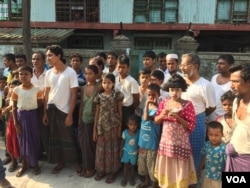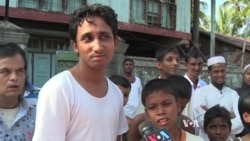In this crowded, noisy camp a few kilometers north of the port city of Sittwe, police guard the entrance and exit, controlling anyone trying to enter as well as those trying to leave.
A single road goes past the impoverished Dar Pang camp, where 958 Rohingya Muslim families live.
Several other villages of displaced Rohingya butt up to the camp, pushing the population upwards of 10,000 people. Wilderness surrounds the villages of thatched-roof huts.
Police and checkpoints are everywhere to prevent a repeat of the bloodletting that started in June 2012 due to ethnic conflict.
VOA was given access to the camp by the government and found the Rohingya living there friendly, open and willing to talk.
Still, the displaced Muslims have much at stake – whether they will keep their ethnic identity or be forced to assume an immigrant status in their own country.
Controversial plan for citizenship
This week Myanmar resumes a process that could end up granting citizenship to the Rohingya people who for years, have been without a country.
But the plan is controversial and will be scrutinized far from impoverished Rakhine state, the epicenter of an ethnic conflict that has sent thousands fleeing throughout Southeast Asia.
The ethnic conflict can be boiled down to two words: Rohingya or Bengali. The two names signify a fight over something much larger in Myanmar; identity, citizenship and a sense of belonging.
Three years ago this month, riots erupted here between the embattled Muslim ethnic minority that has long called themselves Rohingya and the Buddhist majority.
Months of ethnic and sectarian violence killed more than 200 people and displaced tens of thousands until security forces moved in and imposed tight controls.
Authorities want these people to first identify themselves as Bengalis before the government determines whether they can become citizens.
Chief Minister Muang Muang Ohn said the term Rohingya implies an ethnic claim that involves territory and is much more complicated than just citizenship.
He said ultimately, they must make a choice.
“If those people, Bengali, participated in the citizenship verification process and if they got citizenship status, they would get automatic rights as a citizen to travel freely,” he said.
“But some people are still resisting to accept the term and participate in the process," he said. "So the question is, do you want citizenship or do you want Rohingya ethnicity?”
Guards are necessary
Myanmar’s Rakhine state is one of the country’s most impoverished and a place where the trauma from the 2012 riots between the Rohingya Muslim minority and the largely Buddhist Rakhine people still shapes the present.
In the south near the capital, Sittwe, it is the Rohingya who need protection from the Buddhist majority Rakhine people.
In the north near Maungdaw, it is villages of Rakhine people where you will find armed guards, protecting the Buddhists from the Muslims who are a large majority in that part of the state.
The debate over a name comes against a backdrop of bitterness and deep distrust between formerly peaceful neighbors.
Sittwe, the dusty state capital, remains almost completely devoid of Muslims except for one neighborhood, known as Aung Minglar.
Here, resident Shwe La said that Rohingya are trapped in their own neighborhood by what they say is an ever present threat of violence from their Buddhist neighbors.
“Since three years after the riot, there have not been more attacks or torching. But our social, health and economic situation has not been improved because we are not allowed to get out of our area freely,” he said.
“We need jobs," he said. "We need education. We have no money,” said another man who called himself Ali.
'No' to citizenship
A few kilometers outside Sittwe, at the Dar Pang camp for displaced Rohingya, the situation seems even worse.
Crowded and dirty with more than 980 families, the residents said they don’t have enough to eat, can’t make a living and see no end in sight. But when asked if they would choose the term Bengali to become citizens, every camp resident who talked with VOA answered a resounding no.
Myanmar’s citizenship verification process officially restarted here this week.
The process is aimed at replacing so-called “White Cards,” which provided temporary residency verification, with new turquoise colored cards that will act as identification while authorities work to consider citizenship requests from those who agree to be identified as Bengali.
But most here say they will keep the term Rohingya because they see themselves as belonging to this part of Myanmar – not as foreigners from nearby Bangladesh. Shwe La said identifying as Bengali leads to the question of when you came to Myanmar, not if you belong there.
With such strong opposition to identifying as Bengali, and the Myanmar government equally unwilling to concede, the impasse that divides this community appears likely to continue.








